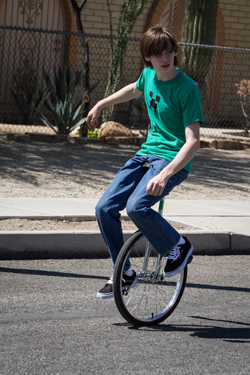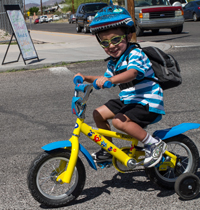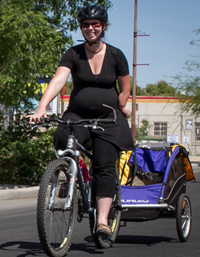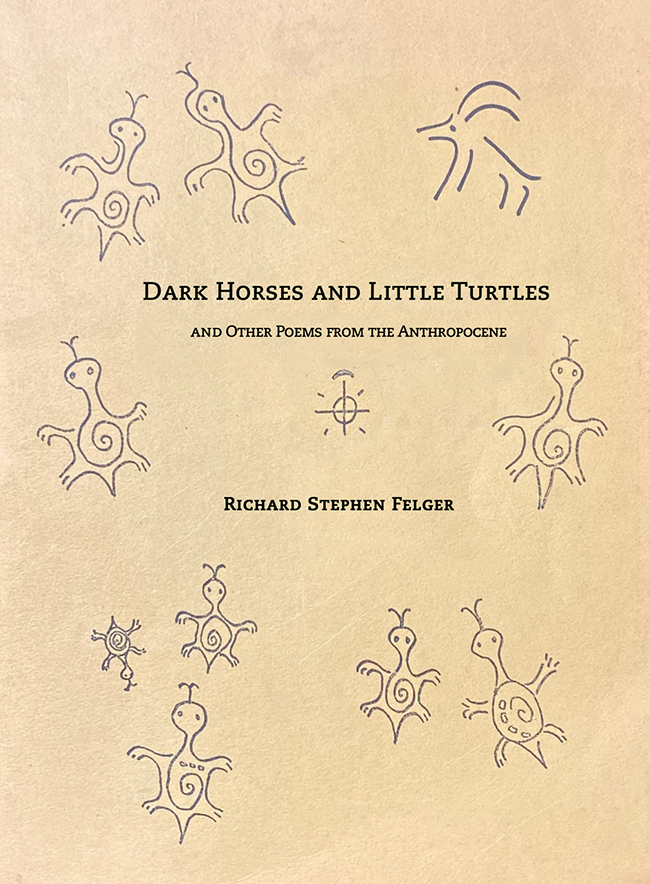April’s Bicycle Hullabaloos

Cyclists of all ages and abilities participate in Cyclovia.
photo: Kathleen Dreier/Esens Photography
Paolo Soleri, the architectural mastermind often credited as the grandfather of sustainability, saw the city as earth’s newest organism. More accurately, he called the city a “hyperorganism,” meaning that it exhibits traits of a living thing (consuming materials, putting out waste, supporting the lives of smaller organisms), but that it lacks the self-governing mechanisms (like a brain) that are available to truly organic things. To Soleri this meant one of two things for cities in general—either a transition to hyper-organization, or degradation into chaos. And by choosing to become so reliant on the automobile to get around our cities, Soleri would say we have been choosing chaos for nearly a century.
“What has been happening in the last few generations,” Soleri said in a 2012 talk to students at his famous experimental city, Arcosanti, Arizona, “is that we are no longer persons, but we are car persons. Because the car has become such a familiar part of the family, an indispensable presence in our lives, we are not separable from the car itself… we have accepted the motorized hermitage of a person in a car.”
Enter the Living Streets Alliance (LSA). According to Kylie Walzak, event coordinator for Cyclovia Tucson (a project of LSA’s Bike Fest), LSA is “Tucson’s non-profit organization working toward a more sustainable city and safer, more people-oriented street design.”
This April marks the fifteenth year of Tucson’s annual Bike Fest, which started in 1991 as “Bike to Work Week,” but has evolved over time into the month-long celebration of all things pedal-powered that it is today.
“The festival is not about the bicycle as much as it is about imagining what our streets could look like if we allowed equal access to them,” says Walzak. “Right now they’re very dominated by one type of transportation—the personal vehicle… Our streets are public spaces but they’re not publicly accessible to everybody.” Walzak explains that taking cars off of the road and opening the streets up to safe bicycle and pedestrian traffic “humanizes (a) landscape that’s often dominated by the loud noise and fast pace of cars.”
And that’s just what the organization is doing.

Cyclists of all ages and abilities participate in Cyclovia.
photo: Kathleen Dreier/Esens Photography
Twice a year, LSA takes over a loop of pavement in either Downtown or midtown Tucson for the bi-annual Cyclovia event, which makes the vision of public streets imagined by the likes of Soleri and Walzak a reality, at least in microcosm. Modeled after similar events that have become extremely popular in places like Bogotá, Columbia (Cyclovia comes from the Spanish ciclovia, or “cycle street”), this spring’s affair will link the neighborhoods of Downtown and South Tucson with a roughly 10-mile corridor of car-free roads.
Perhaps the most exciting part of Cyclovia 2014 is the fact that two independent music festivals are flanking the north and south ends of the loop along South Sixth and South Fourth Avenues. To the north, Armory Park hosts the first ever Tucson Hullabaloo—a Flagstaff transplant that has been voted Best Annual Event by Flagstaff Live! (a weekly alternative magazine) four-years running, and to the south, the City of South Tucson stages a mini-revival of their Norteño Music Festival at Tucson Greyhound Park with Feria De Sur Tucson.
Though Cyclovia is undeniably the pinnacle of Bike Fest, events will be held throughout the month of April in observance of the festival. Walzak says, for instance, that the folks behind the local Tuesday Night Bike Rides are putting on a bike-in movie series in secret locations throughout the city only accessible to non-motorized modes of transportation, and the two-mile commuter challenge will run citywide the entire month long.
Ann Chanecka, bicycle and pedestrian coordinator for the City of Tucson, says that an estimated 43 percent of all trips (yes, that means ALL trips) are less than two miles long, and that a whopping 85 percent of those trips are still made by car—a fact she attributes largely to a lack of bicycle accessibility in the city. She says that, in addition to the $5.5 million put into bicycle and pedestrian infrastructure last year, the City of Tucson is poised to invest another $5 million this year, including the installation this summer of Tucson’s first physically protected bike lane, along St. Mary’s Road between I-10 and Main Street. By making bike lanes safer and getting more of its citizens on bicycles, the goal is to take Tucson’s community rating from the Legion of American Bicyclists from Gold to Platinum—a designation shared by only four cities nationwide.

photo: Kathleen Dreier/Esens Photography
Even Mayor Jonathan Rothschild is weighing in on the importance of bicycles to our community—he’s agreed to join in on the two-mile commuter challenge himself, for one. He says that, not only are alternative modes of transportation like bicycling and walking great for the environment, making bike safety and accessibility a priority in Tucson will help supplement the local economy. In addition to their obvious appeal to cycle-loving tourists and as an alternative source of transportation, Mayor Rothschild says that tech companies are looking to associate their businesses with bike friendly towns. “We have found, and studies have shown, that the folks that are going to be the economic drivers of the next generation… love bicycling and want to be in communities where there is a strong bike ethic,” says the Mayor.
Mayor Rothschild is also quick to talk about the personal benefits of stepping away from your car once-in-a-while: on a bike, he says, “you really get to know your city better… life moves just a little slower, although not much slower, but slow enough to where you notice [things in] your neighborhood” you might otherwise have missed.
Perhaps that’s why bikes seem to be making such a strong resurgence as a primary mode of getting from A to B—says Walzak, “it’s fair to say that the bicycle has reached mythical proportions in terms of marketing and cool cachet.”
If only that were true when I was in high school.
Bike Fest is ongoing throughout the month of April. More info at BikeFestTucson.com. Cyclovia takes place on April 6 from 10am-3pm, CycloviaTucson.org. Feria De Sur Tucson runs concurrently with Cyclovia and is free to attend, see FeriaDeSurTucson.com. Tucson Hullabaloo, TucsonHulla.com, runs April 5-6 from 10am-9pm on Saturday, 10am-8pm on Sunday. Tickets are $5 or free to the first 500 people with two cans of food.
Category: Community, DOWNTOWN / UNIVERSITY / 4TH AVE, Events, Living




